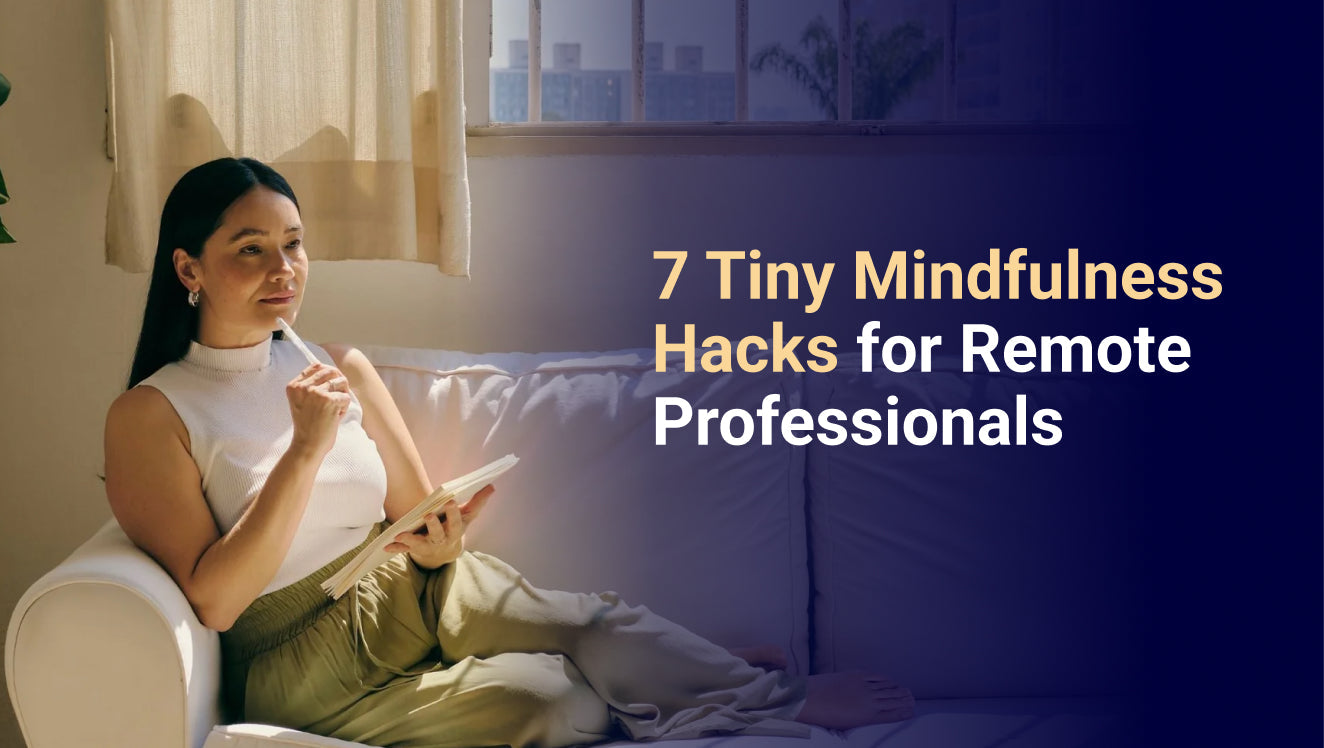The remote revolution promised freedom no commute, more flexibility, and time to live life on your own terms. Yet, for many of us, that promise turned into something else entirely: an always-on, boundary-less existence where “logging off” feels impossible. The home office became the office-home.
Sound familiar? You’re not alone. A staggering 86% of full-time remote workers report experiencing burnout (Zippia, 2023). The culprit isn’t just workload it’s the constant mental presence. When your laptop is always within reach, your brain never really leaves work mode. Over time, this state of hyper-alertness dulls focus, heightens anxiety, and drains joy.
But here’s the good news: recovering doesn’t require a sabbatical or hours of meditation. What you need are micro-interventions short, scientifically grounded practices that reset your nervous system in minutes. These seven tiny mindfulness hacks are designed to help you reclaim clarity, presence, and calm one breath, one sip, one step at a time.
1. The Coffee-Cup Body Scan (90 Seconds)
You don’t need a 20-minute guided meditation to reconnect with your body. The Body Scan one of the most validated mindfulness practices can be done in the time it takes to sip your coffee.
Hold your mug, close your eyes (or lower your gaze), and do a quick mental check-in: your jaw, your shoulders, your back, your hands. Notice tension without judging it. This tiny pause stops your stress autopilot and brings your attention back to the here and now.
It’s a 90-second neural reset proof that mindfulness doesn’t have to be slow to be powerful.
2. The 5-4-3-2-1 Grounding Technique (3 Minutes)
Before a big presentation or after an intense email, anxiety can pull your mind into the past or the future. The 5-4-3-2-1 technique acts like a handbrake for runaway thoughts by engaging your senses:
-
5 things you can see
-
4 things you can feel
-
3 things you can hear
-
2 things you can smell
-
1 thing you can taste
This method activates your prefrontal cortex the logical, calming part of your brain helping you re-anchor in the present. In just minutes, you can dissolve spiralling stress and reset your focus.
3. The 3-Deep Breath Focus Reset (30 Seconds)
When your brain feels cluttered, the simplest solution is also the most effective: controlled breathing. Research in Frontiers in Psychology (2021) shows that slow, intentional breathing lowers cortisol levels and balances your autonomic nervous system.
Try this:
-
Inhale through your nose for 4 counts.
-
Hold for 4.
-
Exhale slowly through your mouth for 6.
Do it three times. That’s 30 seconds total. This “micro-dose of calm” restores clarity and prepares your brain for the next task.
4. Mindful Transition Walks (1 Minute)
In an office, transitions happened naturally walking to a meeting, grabbing lunch. Remote work erased those physical boundaries. Without them, your brain never fully switches context.
Reintroduce them intentionally. Between tasks, stand up and walk even if it’s just a lap around your desk. Focus on your feet lifting, your arms swinging, the air against your skin. These tiny walks tell your brain, “That task is done; a new one begins.” It’s movement as mindfulness short, simple, and highly effective for cognitive reset.
5. The Single-Task Sinkhole (5 Minutes)
Multitasking is a myth. Neuroscientists agree that the brain doesn’t truly multitask; it rapidly switches between tasks, losing energy with every jump.
Instead, pick one micro-task something that takes under five minutes and do it completely uninterrupted. Silence notifications, close tabs, and commit fully.
This trains your brain to sustain attention, building “focus endurance” like a muscle. One tiny, complete task often feels more satisfying than an hour of fractured multitasking.
6. The Digital Sunset Ritual (2 Minutes)
That nagging feeling “Did I forget something?” is your brain’s way of keeping tabs open. End your day with a Digital Sunset:
-
Write down three things you accomplished today (no matter how small).
-
Note one priority for tomorrow.
This two-minute reflection closes mental loops, prevents evening rumination, and allows your brain to truly log off. You’ll sleep better and start the next day with clarity instead of chaos.
7. Elevate Your Brain State with neuroVIZR
Sometimes, even with mindfulness, the fog feels too heavy to lift. That’s when technology can step in not to replace mindfulness, but to amplify it.
The neuroVIZR device is a non-invasive, neuroscience-based tool that uses dynamic light and sound to guide your brain into optimal states. It leverages the principle of neuroplasticity your brain’s ability to rewire itself by gently shifting neural activity from high-stress Beta waves into calmer Alpha and Theta states.
This isn’t passive relaxation. It’s active Brain Engagement helping your mind unlearn “always-on” patterns and access focus and calm on demand. Use it for short sessions to strengthen your mental flexibility and make every micro-hack more effective.
The Takeaway
Remote work burnout isn’t inevitable. The secret isn’t working less it’s learning to pause better.
These seven mindfulness micro-hacks from the Coffee-Cup Body Scan to the Digital Sunset are small, powerful acts of neural recalibration. When you pair them with a neuro-enhancement tool like neuroVIZR, you create a foundation of calm resilience that supports both productivity and peace of mind.
Start with one tiny shift today. Your brain and your well-being will thank you.
References
-
Zippia. (2023). Remote Work Burnout Statistics. Retrieved from https://www.zippia.com/
-
Frontiers in Psychology. (2021). Effects of Slow Breathing on Stress and Cortisol Levels.
-
American Psychological Association. (2020). Multitasking: Switching Costs and Cognitive Load.
-
Harvard Health Publishing. (2022). Mindfulness and the Brain: How Meditation Changes Neural Pathways.
-
neuroVIZR. (2024). Neuroplasticity and Dynamic Sensory Stimulation: A New Frontier in Mental Clarity.



























Share:
Balancing Brain States: Criticality as the Sweet Spot for Peak Performance
10 Quick Mid-Day Reset Tips to Kick Work Stress